3. General Matrix Multiply (GEMM)¶
Catalog of Features¶
In this section, you will learn about the following components in Spatial:
- MemReduce and MemFold
- Instrumentation Hooks
- Advanced Banking
- Advanced Buffering
Application Overview¶
General Matrix Multiply (GEMM) is a common algorithm in linear algebra, machine learning, statistics, and many other domains. It provides a more interesting trade-off space than the previous tutorial, as there are many ways to break up the computation. This includes using blocking, inner products, outer products, and systolic array techniques. In this tutorial, we will demonstrate how to build a blocked GEMM app that uses outer products, and leave it to the user to try and build a GEMM version that uses inner products. Later tutorials will show how to use shift registers and systolic arrays in other applications, but the same techniques can be retroactively applied to this tutorial on GEMM as well.
Data Setup and Validation¶
Let’s start by creating the data structures above the Accel that we will set up the matrices and compute the gold check. We will expose the dimensions of the matrices as command-line arguments.
import spatial.dsl._
import virtualized._
object GEMM extends SpatialApp {
@virtualize
def main() {
type T = FixPt[TRUE,_24,_8]
val M = ArgIn[Int]
val N = ArgIn[Int]
val K = ArgIn[Int]
setArg(M,args(0).to[Int])
setArg(N,args(1).to[Int])
setArg(K,args(2).to[Int])
val a_data = (0::args(0).to[Int], 0::args(2).to[Int]){(i,j) => random[T](3)}
val b_data = (0::args(2).to[Int], 0::args(1).to[Int]){(i,j) => random[T](3)}
val c_init = (0::args(0).to[Int], 0::args(1).to[Int]){(i,j) => 0.to[T]}
val a = DRAM[T](M, K)
val b = DRAM[T](K, N)
val c = DRAM[T](M, N)
setMem(a, a_data)
setMem(b, b_data)
setMem(c, c_init)
Accel {}
val accel_matrix = getMatrix(c)
val gold_matrix = (0::args(0).to[Int], 0::args(1).to[Int]){(i,j) =>
Array.tabulate(args(2).to[Int]){k => a_data(i,k) * b_data(k,j)}.reduce{_+_}
}
printMatrix(accel_matrix, "Received: ")
printMatrix(gold_matrix, "Wanted: ")
val cksum = accel_matrix.zip(gold_matrix){_==_}.reduce{_&&_}
println("Pass? " + cksum)
}
}
Notice that we create an initial matrix for the result and set all values to 0. This is necessary because GEMM using outer products computes part of a tile of the result and accumulates this on top of what was previously in that tile. This means we will need to fetch a tile from off-chip DRAM and accumulate a new result on top of that, then write this new tile back.
MemReduce and MemFold¶
The animation below shows how to compute GEMM without tiling, using outer products.
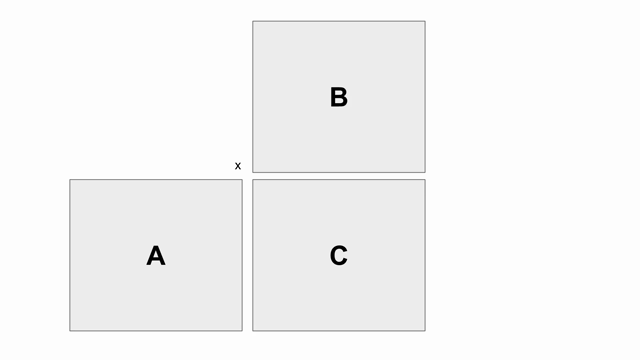
Because we cannot create hardware to handle variable-sized matrices, we must tile the problem. The animation below shows one valid scheme for doing so. We will set our tile sizes in the M, N, and K dimensions above the Accel as follows:
val tileM = 16
val tileN = 16
val tileK = 16
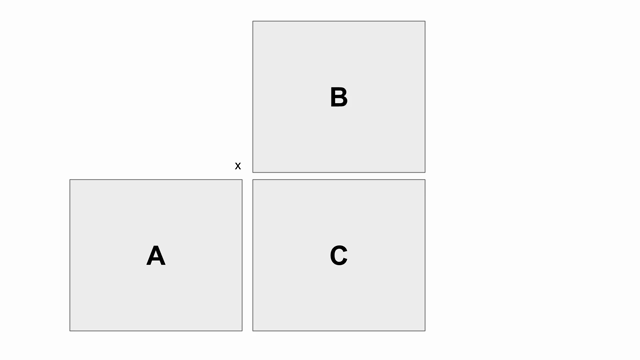
Note that this is not necessarily the most efficient implementation of this algorithm. It is simply meant to be an implementation that demonstrates features of Spatial.
Now let’s write the code to implement this computation. The large arrows and boxes represent matrix multiplies on the highlighted tiles using outer products. There will be six nested loops: one for each dimension of tiling and one for each dimension within the tile.
Considering the tiling loops first, this particular animation shows that we are treating the N dimension as the innermost loop, followed by the M dimension, and finally the K dimension. Below shows the nested loops along with the data structures and their tile transfers required within each scope. Remember that you may add parallelization wherever you please:
Accel {
Foreach(K by tileK){kk =>
val numel_k = min(tileK.to[Int], K - kk)
Foreach(M by tileM){mm =>
val numel_m = min(tileM.to[Int], M - mm)
val tileA_sram = SRAM[T](tileM, tileK)
tileA_sram load a(mm::mm+numel_m, kk::kk+numel_k)
Foreach(N by tileN){nn =>
val numel_n = min(tileN.to[Int], N - nn)
val tileB_sram = SRAM[T](tileK, tileN)
val tileC_sram = SRAM.buffer[T](tileM, tileN)
tileB_sram load b(kk::kk+numel_k, nn::nn+numel_n)
tileC_sram load c(mm::mm+numel_m, nn::nn+numel_n)
c(mm::mm+numel_m, nn::nn+numel_n) store tileC_sram
}
}
}
}
Note that we must compute the numel_* values to handle the edge cases correct, when the tile dimensions
do not evenly divide the full matrices.
Also note that we declare tileC_sram as a .buffer SRAM. If you do not declare it this way,
then the compiler will throw an error about this and explain the issue. You will learn more about
this in the Advanced Buffering section below.
Next, we will implement the full outer product of the tiles that we have brought into the chip:
Accel {
Foreach(K by tileK){kk =>
val numel_k = min(tileK.to[Int], K - kk)
Foreach(M by tileM){mm =>
val numel_m = min(tileM.to[Int], M - mm)
val tileA_sram = SRAM[T](tileM, tileK)
tileA_sram load a(mm::mm+numel_m, kk::kk+numel_k)
Foreach(N by tileN){nn =>
val numel_n = min(tileN.to[Int], N - nn)
val tileB_sram = SRAM[T](tileK, tileN)
val tileC_sram = SRAM.buffer[T](tileM, tileN)
tileB_sram load b(kk::kk+numel_k, nn::nn+numel_n)
tileC_sram load c(mm::mm+numel_m, nn::nn+numel_n)
MemFold(tileC_sram)(numel_k by 1){k =>
val tileK_local = SRAM[T](tileM, tileN)
Foreach(numel_m by 1, numel_n by 1){(i,j) =>
tileK_local(i,j) = tileA_sram(i,k) * tileB_sram(k,j)
}
tileK_local
}{_+_}
c(mm::mm+numel_m, nn::nn+numel_n) store tileC_sram
}
}
}
}
Notice that the code added in the above snippet uses a MemFold and creates a new memory called
tileK_local inside of it. The MemFold is similar to the Fold used in the previous 1. Vector Inner Product
example, except it operates on SRAMs and RegFiles rather than Regs. The SRAM returned in the body of the map function
of the MemFold must match the dimensions of the accumulating SRAM given to the controller.
There is also a MemReduce node, which is analogous to the Reduce node for Regs, but this particular node
will not work in this design because we need to accumulate a new partial sum on top of the partial sum that was
previously stored for a particular tile in DRAM. The MemReduce controller will directly write the result of the
map function on the first iteration of the controller (i.e.- when k == 0), and then respect the lambda function (i.e.- addition)
for every iteration after that.
Advanced Buffering¶
This Accel above already implements coarse-grain pipelining at various levels. For example, the controller whose counter is nn has
three stages in it. The first stage loads tileB_sram and tileC_sram`` in parallel, the second stage performs the MemFold
into tileC_sram, and the third stage writes the resulting tileC_sram back into the appropriate region of DRAM. This is an
example where the compiler will create a triple-buffer for tileC_sram in order to ensure that the correct values are being worked with
when this coarse-grain pipeline fills up and executes.
If you had not declared tileC_sram as a .buffer SRAM, then the compiler is suspicious of your code. This is because it is generally
very easy when specifying pipelined hardware to accidentally create loop-carry dependency issues. Specifically, in this code, it sees that
you write to the SRAM in the first stage, and then write to it again in the second stage. It is very easy, even for advanced users, to
write this kind of structure without realizing it and then receive an incorrect result when using a cycle-accurate simulator of the hardware
because of values “rotating” through the buffer inadvertently.
The animation below specifically demonstrates the triple buffer tileC_sram in this algorithm.
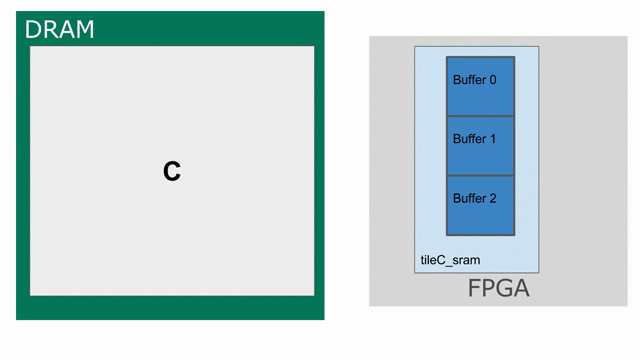
Note that at the beginning and end of each row, there are a few iterations where parts of the buffer are not being used. This is because of the way the loops are written, such that we step through each tile in the N dimension before we increment the tile for M. If you want to write the app such that there are no wasteful fill and drain iterations, you must combine loops appropriately.
Advanced Banking¶
Let’s now add in more optimizations to improve the performance of this application. Specifically, we will parallelize two of the
loops in such a way to expose hierarchical banking. The following code shows the loops for k and j parallelized by 2 and 4
respectively.:
Accel {
Foreach(K by tileK){kk =>
val numel_k = min(tileK.to[Int], K - kk)
Foreach(M by tileM){mm =>
val numel_m = min(tileM.to[Int], M - mm)
val tileA_sram = SRAM[T](tileM, tileK)
tileA_sram load a(mm::mm+numel_m, kk::kk+numel_k)
Foreach(N by tileN){nn =>
val numel_n = min(tileN.to[Int], N - nn)
val tileB_sram = SRAM[T](tileK, tileN)
val tileC_sram = SRAM.buffer[T](tileM, tileN)
tileB_sram load b(kk::kk+numel_k, nn::nn+numel_n)
tileC_sram load c(mm::mm+numel_m, nn::nn+numel_n)
MemFold(tileC_sram)(numel_k by 1 par 2){k =>
val tileK_local = SRAM[T](tileM, tileN)
Foreach(numel_m by 1, numel_n by 1 par 4){(i,j) =>
tileK_local(i,j) = tileA_sram(i,k) * tileB_sram(k,j)
}
tileK_local
}{_+_}
c(mm::mm+numel_m, nn::nn+numel_n) store tileC_sram
}
}
}
}
Now let’s look at what happens to tileB_sram. It’s first and second indices are both parallelized.
Index j is vectorized by 4, while index k is duplicated for two different values of k when the
loop is unrolled by 2. This means we must bank tileB_sram in both the horizontal and vertical dimensions
in order to guarantee that all 8 of these accesses will be able to touch unique banks every time we read from this memory.
The animation below demonstrates how we hierarchically bank this SRAM.
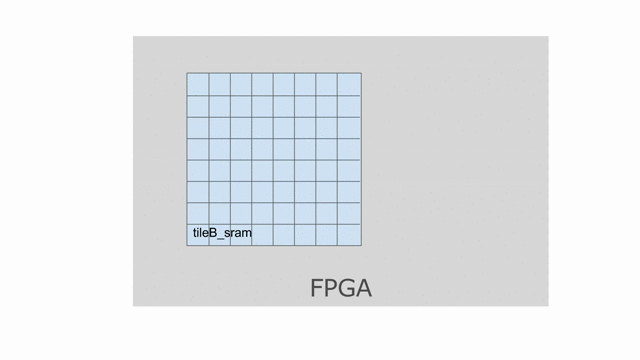
Let’s consider the situation if we instead decided to parallelize a different way. Below is the code for the application
if we chose to parallelize the loading of tileB_sram by 8 while also parallelizing the k loop by 2.:
Accel {
Foreach(K by tileK){kk =>
val numel_k = min(tileK.to[Int], K - kk)
Foreach(M by tileM){mm =>
val numel_m = min(tileM.to[Int], M - mm)
val tileA_sram = SRAM[T](tileM, tileK)
tileA_sram load a(mm::mm+numel_m, kk::kk+numel_k)
Foreach(N by tileN){nn =>
val numel_n = min(tileN.to[Int], N - nn)
val tileB_sram = SRAM[T](tileK, tileN)
val tileC_sram = SRAM.buffer[T](tileM, tileN)
tileB_sram load b(kk::kk+numel_k, nn::nn+numel_n par 8)
tileC_sram load c(mm::mm+numel_m, nn::nn+numel_n)
MemFold(tileC_sram)(numel_k by 1 par 2){k =>
val tileK_local = SRAM[T](tileM, tileN)
Foreach(numel_m by 1, numel_n by 1){(i,j) =>
tileK_local(i,j) = tileA_sram(i,k) * tileB_sram(k,j)
}
tileK_local
}{_+_}
c(mm::mm+numel_m, nn::nn+numel_n) store tileC_sram
}
}
}
}
While the hierarchical banking scheme shown above will still work for this case, where we have 2 banks along the rows and 8 banks along the columns, the Spatial compiler will perform a memory-saving optimization called Diagonal Banking. In this example, we need to be able to access 8 elements along the column simultaneously, and later in the app we need to access 2 elements from different rows simultaneously. However, these accesses do not occur at the same time, so we do not need 16 unique banks (as is implied by the previous example) and can get away with 8 banks.
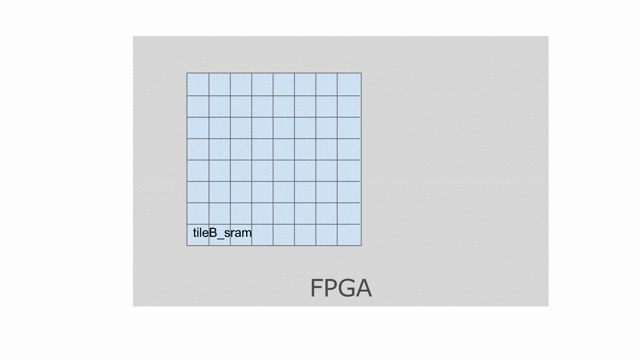
If the parallelizations of the various accesses are not multiples of each other, the compiler will figure out the most minimalistic banking scheme that guarantees correctness.
Final Code¶
Below is the complete GEMM app. See the HelloWorld page for a refresher on how to compile and test an app:
import spatial.dsl._
import virtualized._
object GEMM extends SpatialApp {
@virtualize
def main() {
type T = FixPt[TRUE,_24,_8]
val tileM = 16
val tileN = 16
val tileK = 16
val M = ArgIn[Int]
val N = ArgIn[Int]
val K = ArgIn[Int]
setArg(M,args(0).to[Int])
setArg(N,args(1).to[Int])
setArg(K,args(2).to[Int])
val a_data = (0::args(0).to[Int], 0::args(2).to[Int]){(i,j) => random[T](3)}
val b_data = (0::args(2).to[Int], 0::args(1).to[Int]){(i,j) => random[T](3)}
val c_init = (0::args(0).to[Int], 0::args(1).to[Int]){(i,j) => 0.to[T]}
val a = DRAM[T](M, K)
val b = DRAM[T](K, N)
val c = DRAM[T](M, N)
setMem(a, a_data)
setMem(b, b_data)
setMem(c, c_init)
Accel {
Foreach(K by tileK){kk =>
val numel_k = min(tileK.to[Int], K - kk)
Foreach(M by tileM){mm =>
val numel_m = min(tileM.to[Int], M - mm)
val tileA_sram = SRAM[T](tileM, tileK)
tileA_sram load a(mm::mm+numel_m, kk::kk+numel_k)
Foreach(N by tileN){nn =>
val numel_n = min(tileN.to[Int], N - nn)
val tileB_sram = SRAM[T](tileK, tileN)
val tileC_sram = SRAM.buffer[T](tileM, tileN)
tileB_sram load b(kk::kk+numel_k, nn::nn+numel_n par 8)
tileC_sram load c(mm::mm+numel_m, nn::nn+numel_n)
MemFold(tileC_sram)(numel_k by 1 par 2){k =>
val tileK_local = SRAM[T](tileM, tileN)
Foreach(numel_m by 1, numel_n by 1){(i,j) =>
tileK_local(i,j) = tileA_sram(i,k) * tileB_sram(k,j)
}
tileK_local
}{_+_}
c(mm::mm+numel_m, nn::nn+numel_n) store tileC_sram
}
}
}
}
val accel_matrix = getMatrix(c)
val gold_matrix = (0::args(0).to[Int], 0::args(1).to[Int]){(i,j) =>
Array.tabulate(args(2).to[Int]){k => a_data(i,k) * b_data(k,j)}.reduce{_+_}
}
printMatrix(accel_matrix, "Received: ")
printMatrix(gold_matrix, "Wanted: ")
val cksum = accel_matrix.zip(gold_matrix){_==_}.reduce{_&&_}
println("Pass? " + cksum)
}
}
Instrumentation Hooks¶
Now that you have finished writing an algorithm, you will want to try to get the best performance possible. In order to get optimal performance, it is important to balance the stages in your pipelines. While you could get a good estimate by eyeballing your code, there is a way to get actual execution cycles on a controller-by-controller basis using a Spatial/special feature called “instrumentation.”
To turn on instrumentation hooks, use the bin/spatial <app name> --synth --instrument flag when compiling the app. This flag
injects performance counters that count the number of cycles each controller is enabled, as well as the number of times a particular
controller is done. Note that performance counters will only be injected in the –synth backend.
Once you compile your app, you should run it normally with the run.sh script. You may notice that there are some extra lines that are spitting out information about the app. Running the run.sh script created a file in your current directory called instrumentation.txt, which will be used to populate a visualization of your app. Let’s start by opening up the controller tree:
google-chrome controller_tree.html # Or whatever your favorite browser is (firefox, etc.)
You will get a screen that looks like this.
Controller Diagram for MatMult_inner
| Hwblock MatMults.scala:139:11 x7564 Counter:
|
If you play around with this screen, you will see that this shows you the control hierarchy in your app, and points each box back to the original source code. To make this a more useful tool, we will now inject the instrumentation results into this page. Run the script:
bash scripts/instrument.sh
Now refresh the controller tree page. There should be a lot of red text, similar to the image shown below:
Controller Diagram for MatMult_inner
Instrumentation Annotiations
| Hwblock MatMults.scala:139:11 x7564 - 45928 cycles/iter (45928 total cycles, 0 total iters) [0 iters/parent execution] Counter:
|
You can now play around with this page and look at how the various stages in your pipelines are performing. We leave it up to the user to figure out how to use parallelizations and rewrite portions of the app to figure out how to balance the pipelines and get better performance.
When you understand the concepts introduced in this page, you may move on to the next example, 3. Differentiator & Sobel Filter, where you will learn to perform reductions on memories, include instrumentation hooks to help balance your pipeline, and see more complicated examples of banking.